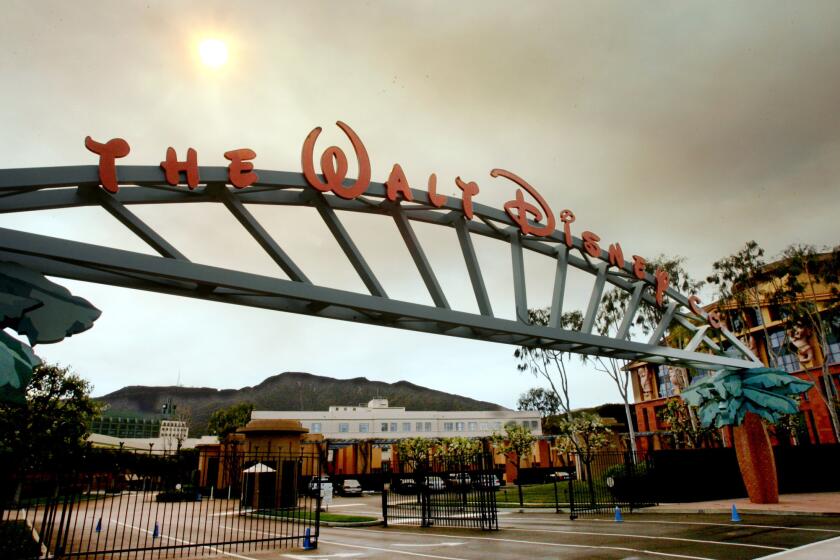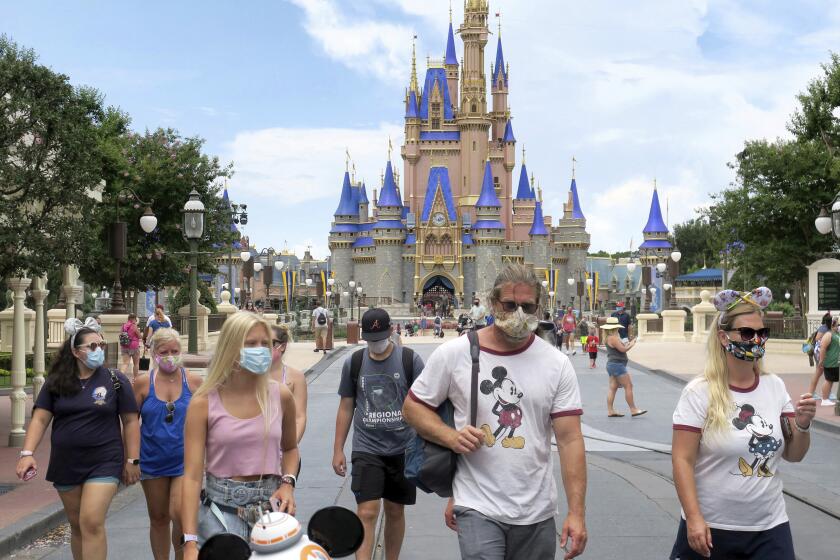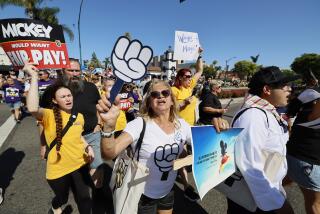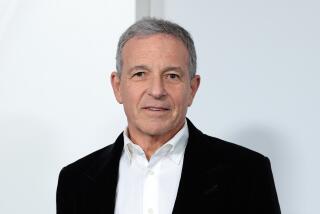Elizabeth Warren attacks Disney for layoffs. Disney says she’s ‘misinformed’

Sen. Elizabeth Warren (D-Mass.) sharply attacked Walt Disney Co. over its plans to lay off 28,000 workers, accusing the company of prioritizing executive pay and shareholder interests over the needs of rank-and-file employees.
The senior Massachusetts senator and former candidate for the Democratic presidential nomination sent a letter Wednesday to Disney Executive Chairman Bob Iger and Chief Executive Bob Chapek, challenging the company’s decision to cut staff in response to the ongoing COVID-19 pandemic.
“It appears that — prior to, and during the pandemic — Disney took good care of its top executives and shareholders — and now is hanging its front-line workers out to dry,” Warren said in the letter.
Disney responded with a statement calling Warren’s letter “misinformed.” The company said the letter contained “a number of inaccuracies” but did not go into detail.
“We’ve unequivocally demonstrated our ability to operate responsibly with strict health and safety protocols in place at all of our theme parks worldwide, with the exception of Disneyland Resort in California, where the State has prevented us from reopening even though we have reached agreements with unions representing the majority of our Cast Members that would get them back to work,” Disney said.
The Burbank-based company said in late September that it would shed thousands of jobs at its parks, experiences and products division. The job losses mostly affect Disneyland Resort in Anaheim and Walt Disney World in Orlando, Fla., but also will hit the entertainment giant’s cruise lines and retail stores.
Disneyland has remain closed since March because of state restrictions, while Disney World has been operating at reduced capacity — factors that have blown a hole through the company’s earnings. Additionally, with movie theaters closed in key cities, Disney has delayed big film releases and sent movies including “Mulan” and “Soul” straight to streaming on Disney+. Production also was hobbled.
The loss of thrills, laughter and magic. Can Disneyland fanatics carry on without the “Happiest Place on Earth”?
In April, Disney furloughed more than 100,000 of its 223,000-person global workforce and continued to pay health benefits to those employees who were put out of work.
Josh D’Amaro, chairman of Disney’s parks, experiences and products segment, called the decision to ultimately begin layoffs “heartbreaking” in a memo to staff, saying it was “the only feasible option we have in light of the prolonged impact of COVID-19 on our business.”
Still, Warren, a frequent and vocal critic of big business and corporate excess, hit Disney for providing executives with “hefty compensation packages” and paying billions in shareholder dividends.
“In the years leading up to this crisis, your company prioritized the enrichment of executives and stockholders through hefty compensation packages, and billions of dollars’ worth of dividend payments and stock buybacks, all of which weakened Disney’s financial cushion and ability to retain and pay its front-line workers amid the pandemic,” Warren wrote.
Early in the lockdown, Disney slashed executive pay to save money, cutting salaries by at least 20% for employees at the vice president level and up. Iger said he would forgo his $3-million annual base salary, while Chapek took a 50% cut to his $2.5-million base compensation.
Warren said in her letter that executive pay has since been restored to pre-pandemic levels. She also noted that the bulk of top-level executive compensation comes from bonuses and stock awards, not salary. Iger’s total compensation was $47.5 million for fiscal 2019, including cash and stock.
Kareem Daniel, who previously ran consumer products for Disney, was promoted to head of distribution for the entire company, including its streaming services.
Many of the attacks by Warren echo previous allegations leveled by documentary film maker Abigail Disney, the granddaughter of company co-founder Roy O. Disney. The heiress earlier accused Disney of lavishly compensating executives at the expense of regular employees, a criticism that the company has called “gross and unfair.”
Executive compensation packages are determined by Disney’s board of directors and are based on the company’s performance for the prior fiscal year. In 2019, the company broke box-office records with films including “Toy Story 4,” “Avengers: Endgame” and “The Lion King.” Disney’s last shareholder dividend was in December, before the pandemic hit. The company in May suspended its semiannual dividend.
Warren’s letter also questioned Disney’s stated logic for why it was cutting jobs. D’Amaro blamed the state of California for keeping Disneyland closed, and the company has been pleading with Gov. Gavin Newsom to allow the park to resume operations.
The senator noted that 6,400 of the nonunion employees Disney laid off were in Florida, as were almost 8,900 unionized part-time employees, citing public documents and local media reports. Those would represent more than half the total layoffs. But that’s partly because Walt Disney World, which has struggled to increase attendance, employs far more people than the California park.
Warren rose to political prominence in the wake of the 2008 financial crisis and resulting recession, serving as a staunch advocate for the Consumer Financial Protection Bureau, which was proposed by her and established by the Dodd-Frank Wall Street Reform and Consumer Protection Act in 2010. Warren became a senator in 2013, after she defeated Republican Scott Brown.
Gov. Newsom says California should do “our own stubborn research” before reopening Disneyland and other theme parks, citing concerns about the spread of COVID-19.
Warren ran for the Democratic nomination in the presidential race but suspended her campaign in March after struggling to gain traction in the race beyond the party’s most liberal members.
Disney’s stock price was walloped by the COVID-19 pandemic but has since made up some ground, partly thanks to the success of Disney+. The company on Monday announced a major reorganization to focus Disney’s efforts on accelerating the growth of its digital services — namely Disney+, Hulu, ESPN+ and Star.
Disney’s stock fell $2.37, or 2%, to $126.59 on Wednesday. Its shares are down about 12% this year, according to FactSet.
More to Read
Inside the business of entertainment
The Wide Shot brings you news, analysis and insights on everything from streaming wars to production — and what it all means for the future.
You may occasionally receive promotional content from the Los Angeles Times.














